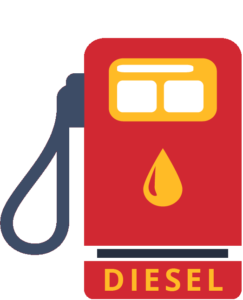
October 20, 2023
Diesel engines are most commonly recognized for their efficiency and reliability under heavy loads, making them the top choice for industries whose bread and butter are long-haul drives and high-torque applications. But are diesel engines as fuel-efficient as they claim to be? The short answer is, yes, but we want to explore why they are more fuel efficient than a gasoline engine. In this blog, we will take a closer look at the differences between a gasoline and diesel engine, the highest efficiency rating, and how that can be applied to real-world diesel engines.
What is the Maximum Fuel Efficiency of a Diesel Engine?
Today, diesel engines have an average fuel efficiency of 20 – 35% more efficient compared to older engines once they have been broken in. Fuel efficiency ratings have continued to improve due to re-engineering the engine design with fuel injection systems, improved management systems, and turbocharging capabilities. The push for increased fuel efficiency goes hand in hand with increased engine durability and meeting emission requirements. While diesel engines are often critiqued for their emissions, continued design improvements have made them far more environmentally friendly than they’ve been in the past.
The largest player in determining a vehicle’s fuel efficiency comes down to the fuel density. Factors that are considered in determining a vehicle’s fuel efficiency include:
- The vehicle’s weight
- Condition
- Age
- Stock or after-market modifications
- Driving habits
- Workload
Taking into account these factors, the largest contender for determining your engine’s fuel efficiency is fuel density. For context, fuel density is the amount of energy in a gallon or litre of fuel.
The fuel density of a diesel engine can range from 13 to 18% more than a gasoline engine. The chemical composition of diesel fuel makes it the denser of the two options, which weighs in its favour. As a rule of thumb, the denser the fuel, the better your mileage will be.
What is the Efficiency of a Diesel Engine in a Truck?
The diesel truck engines that rank with the highest fuel efficiency are Cummins, Powerstroke, and Duramax. Heavy and Medium-duty diesel engines will see an average of 14 MPG for 6.6 Duramax and 6.7 Cummins diesel engines. The 6.7 Powerstroke diesel engine has the highest average for fuel efficiency with 15 MPG.
Are Diesel Engines more Fuel-Efficient than Gasoline Engines?
Let’s consider some of the differences between diesel and gasoline engines that play into fuel efficiency. Both use a four-stroke combustion cycle: intake, compression, power, and exhaust. However, the way they handle this cycle is where the magic happens.
- Intake and Compression: Diesel engines draw in air during the intake stroke only and compress it at a significantly higher ratio compared to gasoline engines.
- Ignition: Unlike gasoline engines, diesel engines do not require spark plugs. Rather, the fuel ignites through compression. For more information, check out our previous blog post!
- Performance: Diesel engines excel in long-haul or highway driving due to their higher torque, which contributes to better fuel efficiency and faster accelerations. By comparison, gasoline engines perform better in start and stop traffic and without a load.
In general, diesel engines and their fuel density contribute to their higher rankings for fuel efficiency over gasoline engines. That being said, diesel engines have a higher price tag attached to their fuel efficiency due to their higher fuel costs, higher purchase prices, and their inefficiency for light loads.
How to Improve a Diesel Engine’s Fuel Efficiency
At DFC Diesel, we are committed to continuing to push industry standards to continue to improve your diesel engine experience and keep you moving while on the road. To bring the fuel efficiency of diesel engines to a whole new level, we are proud to carry Speed of Air Hyperformance Pistons. Save more on your engine when you opt for a Hyperformance Piston. When you upgrade your remanufactured engine with Hyperformance Pistons, you can see an increase of 15-25% in fuel efficiency. Some of the other benefits include:
- Reduced oil change intervals by 50%
- Reduced Regn Cycles and DEF Use
- Decreased NoX by 20-80%
- Reduced emissions
- Smoother running engine
Are you interested in learning more about how you can save with increased fuel efficiency for your diesel engine? Check out our Speed of Air engine series today and find out what you can save with our cost calculator!





